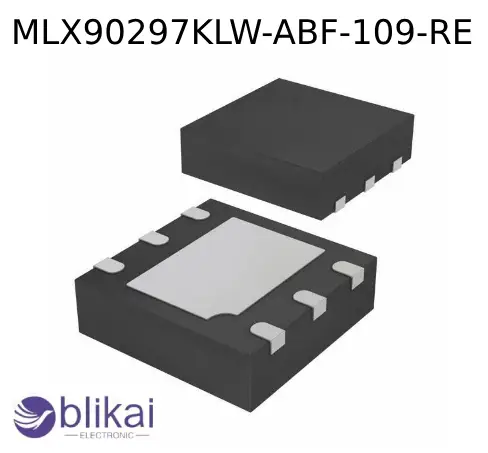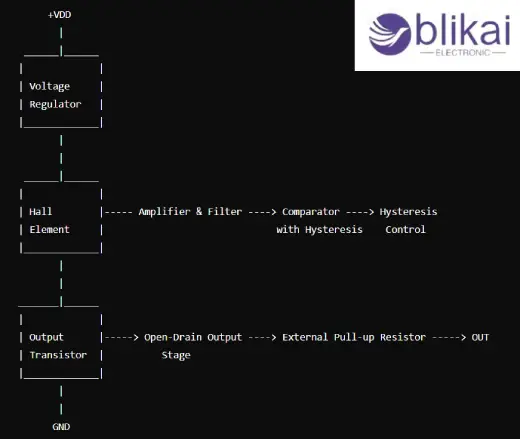MLX90297KLW-ABF-109-RE Melexis Technologies NV
The MLX90297KLW-ABF-109-RE is a tiny yet powerful sensor, specifically a Hall-effect switch, which you can think of as a super-smart on/off button that works with magnets. Imagine it like this: whenever a magnet gets close to this sensor, it instantly detects the magnetic field and flips the switch on. When the magnet moves away, it flips the switch off.

What is MLX90297KLW-ABF-109-RE?
The part number for the Melexis Hall effect sensor is MLX90297KLW-ABF-109-RE. Hall effect sensors are widely utilized in applications such as position, velocity, and electric current sensing. They are used to detect magnetic fields.
What Makes It Special?
1. Non-Contact Sensing: The MLX90297 doesn't need to touch anything to work. Because it "senses" magnetic fields remotely, it's perfect for applications like industrial machinery or automobile engines where you want to prevent wear and tear.
2. Tiny and Mighty: Compact enough to squeeze through narrow openings and robust enough to withstand challenging circumstances, like those found in cars.
3. Reliable and Precise: The precision and dependability of this sensor are well known. It consistently detects magnetic fields without being easily fooled by other factors like temperature changes.
Where Would You Find It?
The MLX90297 is frequently used in automotive applications, like component position detection. (Consider how your vehicle detects when a door is closed.) It is also utilized in industrial automation for jobs like assembly lines that call for precise and dependable position sensing.
Part Number Breakdown:
Breaking down the part number MLX90297KLW-ABF-109-RE helps us understand what each segment signifies:
-MLX: Manufacturer (Melexis)
-90297: Specific sensor model
-K, L, W: Configuration, operational range, and packaging type
-ABF: Features or factory programming
-109: Configuration or sensitivity setting
-RE: Packaging method (Reel)
Key Features of MLX90297KLW-ABF-109-RE
1. Latch-Type Hall-Effect Switch
-The MLX90297 functions as a latch, which implies that it shifts its state in response to a magnetic field and holds onto it until the magnetic field's polarity is reversed. This is especially helpful for applications like gear detection or rotary encoders that require the detection and maintenance of state changes.
2. High Sensitivity
-Because of its low-level magnetic field detecting architecture, the sensor is perfect for applications requiring precise detection of minute changes in magnetic fields. This is particularly significant for automotive applications where precision is essential.
3. Wide Operating Voltage Range
-It can be used in a wide range of power supply situations, from low-power portable devices to automotive environments requiring great precision. Its normal operating voltage range is from 2.7V to 24V.
4. Low Power Consumption
-Because of its low power consumption optimization, the MLX90297 is perfect for battery-powered applications or systems where energy efficiency is crucial.
5. Robust Design for Harsh Environments
-The sensor is designed to survive in challenging conditions. This toughness, which is frequently used in industrial and automotive applications, guarantees dependable performance even in the most trying circumstances.
6. Small Package Size
-Because of its small size, it can be easily integrated into designs that have limited space. Due to its compact size, performance may be maintained even in minor assembly operations.
7. Factory-Programmable Magnetic Switch Points
-The sensor's magnetic switch points can be factory-programmed, allowing customization for specific applications. This flexibility helps in fine-tuning the sensor's response to the magnetic field for different use cases.
8. Reel Packaging
-The part number "RE" denotes that the sensor is offered in reel form, making it appropriate for automated assembly. This qualifies it for large-scale manufacturing.
9. RoHS Compliance
-The MLX90297 satisfies environmental requirements and is free of hazardous materials because it complies with RoHS (Restriction of Hazardous Substances) compliance. It is hence a secure option for a range of uses.
MLX90297KLW-ABF-109-RE Pin Diagram
The MLX90297 is a unipolar Hall-effect switch manufactured by Melexis. The specific part number MLX90297KLW-ABF-109-RE indicates its package type and specific configurations:
-KLW: Denotes the package type, which is TSOT-3.
-ABF-109: Specific configuration or sensitivity setting.
-RE: Tape and reel packaging.
TSOT-3 Package Pin Configuration
The TSOT-3 package is a 3-pin surface-mount package. Below is the pin assignment for this package:
|
Pin Number |
Pin Name |
Description |
|
1 |
V<sub>DD</sub> |
Supply Voltage |
|
2 |
OUT |
Output Signal |
|
3 |
GND |
Ground Connection |
Pin Diagram (Top View)
.webp)
-Pin 1 (V<sub>DD</sub>): Located on the left when viewing the top side with pins facing down.
-Pin 2 (OUT): Middle pin.
-Pin 3 (GND): Rightmost pin.
Additional Notes
-Supply Voltage (V<sub>DD</sub>): Typically ranges from 3.3V to 24V, but always refer to the datasheet for exact values.
-Output Signal (OUT): Open-drain output that requires a pull-up resistor.
-Ground (GND): Connect to the system ground.
Simplified Functional Diagram

Explanation:
-Hall Element: Detects the magnetic field and converts it to a voltage signal.
-Signal Conditioning Circuit: Increases the Hall voltage and filters it.
-Comparator with Hysteresis: Stabilizes the output by comparing the conditional signal with a hysteresis threshold.
-Output Transistor (Open-Drain): Regulates the output signal in accordance with the comparator's judgment; depending on the strength of the magnetic field, the output may be pulled down or permitted to rise.
-Voltage Regulator: Gives the internal circuits steady power.
Working Principle of the MLX90297KLW-ABF-109-RE
1. Hall Effect Sensing:
-Hall Element: The Hall element, a semiconductor device that produces a voltage when exposed to a glamorous field, is located in the center of the MLX90297. When a glamorous field that's vertical to the current passing through a semiconductor produces the Lorentz force, a Hall voltage is produced. This miracle is known as the Hall effect.
2. Magnetic Field Detection:
-Unipolar Operation: The MLX90297 is designed to detect the South pole of a magnet. The Hall element responds to this magnetic field and generates a voltage proportional to the strength of the magnetic field.
3. Signal Conditioning:
-Amplification and Filtering: The signal from the Hall element is very small, so it is first amplified by internal circuitry. This amplified signal is then filtered to remove any noise and stabilize the signal.
4. Comparator:
-Threshold Comparison: The conditioned signal is fed into a comparator. The comparator compares the Hall voltage against a predefined threshold voltage (operating point). This threshold is adjusted to cause the sensor to react to a specific strength of magnetic field.
-Hysteresis: The MLX90297 has hysteresis to prevent unstable switching caused by minute changes in the magnetic field. This indicates that there are two requirements: one for the operational point (opening) and another for the closing. (point of discharge) The output is stabilized by the dead zone this hysteresis causes.
5. Output Stage:
-Open-Drain Output: This indicates that when the output transistor is turned on, it can pull the output low, but it can not be pulled advanced. When the transistor is out, the output must be pulled grandly using an external pull-up resistor.
-Output Behavior:
-Magnetic Field Present: When the South pole of the magnet is close enough to the Hall element, the output transistor turns on, pulling the output to ground (logic 0).
-Magnetic Field Absent: When the magnetic field strength falls below the release threshold, the output transistor turns off, and the external pull-up resistor pulls the output high (logic 1).
6. Power Supply and Stability:
-Supply Voltage (V<sub>DD</sub>): The intrinsic circuitry of the sensor guarantees steady functioning within this range, which is normally supplied by a supply voltage ranging from 3.3V to 24V.
-Current Consumption: Because the sensor draws little current, it is perfect for battery-operated devices.
7. Summary of Operation:
1. Magnet Proximity: The Hall element detects the presence of a South pole magnetic field.
2. Signal Processing: The detected magnetic field generates a Hall voltage, which is amplified and conditioned.
3. Threshold Detection: The comparator checks if the Hall voltage exceeds the operating threshold.
4. Output Switching: Based on the comparator's output, the open-drain transistor switches the output between low and high states.
5. Hysteresis Handling: The hysteresis ensures stable switching and reduces noise.
Applications of MLX90297KLW-ABF-109-RE
Door and Window Sensors
Proximity Sensors
Automotive Lid Position Sensing
Rotary Position Sensors
Linear Position Sensors
Speed Sensors
Pedal Position Sensors
Laptop Lid Detection
Smartphone Lid Detection
Consumer Electronics Touchless Controls
Robotic Arm Positioning
Conveyor Systems Monitoring
Limit Switches in Industrial Machinery
Safety Interlocks
Elevator Position Sensing
Medical Equipment Positioning
Power Tool Safety
Agricultural Equipment
Industrial Automation
Home Automation
Elevator Doors Monitoring
Fitness Equipment
Advantages of MLX90297KLW-ABF-109-RE
Low Power Consumption
Compact Size
High Sensitivity
Reliable Digital Output
Hysteresis for Stability
Wide Supply Voltage Range
Fast Response Time
Open-Drain Output
Temperature Range
Robust Design
ESD Protection
RoHS and Halogen-Free Compliance
Minimal Mechanical Wear
Simplified Circuit Design
Versatile Applications
Stable Performance
Cost-Effective
Low Output Voltage Drop
Easy to Interface
High Integration
Excellent Noise Immunity
Versatile Mounting Options
What type of magnet should be used with the MLX90297?
The MLX90297 is designed to detect the South pole of a magnet. Use a magnet with appropriate strength to ensure the sensor operates within its specified thresholds.
Related Articles
MLX91221KDF-ABF-120-RE Melexis Current Sensor
ACS712 Current Sensor:Principle,Features and Applications
Robot Sensor : Principle and Its Applications
IR Sensors: Schematic and Priciple Explained
Temperature Sensor Selection: Types & Design Techniques Analysis
Comprehensive Guide to Common Sensors
What are Proximity Sensors ?
Intelligent Sensors: Definition, Configurations, and Utilizations
Flexible Sensor Complete Guide
What is Conductivity Sensor?
Run Capacitor vs Start Capacitor
What are Lighting Ballasts?










